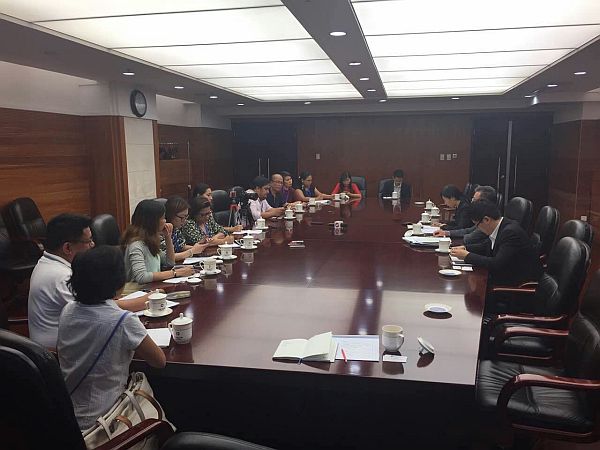
Peng Gang (second from right), deputy director general of the Department of Asian Affairs under the Ministry of Commerce of the People’s Republic of China, briefs media on the economic cooperation between China and the Philippines.
CDN PHOTO/CRIS EVERT LATO-RUFFOLO
Current China-PH economic relationship has resulted in $24B worth of investment projects
Beijing — China is poised to strengthen economic relations with the Philippines and follow through with its investment pledges via infrastructure development nine months after President Rodrigo Duterte’s official visit here, an official of the Ministry of Commerce (MOFCOM) said.
Peng Gang, deputy director general of MOFCOM’s Department of Asian Affairs, said economic cooperation between the Philippines and China continues to grow stronger in the import-export field, infrastructure development and two-way investments.
In a 40-minute press briefing here, Peng outlined the areas of economic cooperation between the two countries which has rekindled its friendly relations after the first meeting of President Duterte and Chinese President Xi Jinping in October 2016 which resulted in a $24 billion worth of investment projects and credit facilities.
In last Wednesday’s briefing, Peng said China is funding the construction of two drug rehabilitation centers in Mindanao with a 300-person capacity, along with feasibility studies of the Davao Skyway and Panay-Negros-Guimaras Link Bridges.
Peng did not mention the project costs of these undertakings.
Trade
Peng described the current China-Philippines relationship as “practical cooperation” that has spawned various trade agreements and investment pledges.
Peng said the first five months of 2017 saw trade volume growth of 8.1 percent from the previous period, which translates to a total amount of $19.4 billion.
“In the year 2016, China is the second-largest trade partner of the Philippines. In the first four months of 2017, trade volume income is $7.1 billion, which accounts for 15 percent of total trade volume of the Philippines,” he said.
“Combining mainland China, Hong Kong and Macau, China is now the biggest trade partner of the Philippines accounting for 20 percent of the trade volume,” he said.
Peng said they had two procurement missions which approved licenses of 21 Philippine companies to export bananas and pineapples. Another seven companies were approved to export mangoes to China. Other Philippine-grown fruits to be exported to China are avocado, mangosteen, melon and dragonfruit.
He said they will provide market access and Customs facilities for Philippine companies to establish business relations with Chinese counterparts.
Investments
Peng said more Chinese investors are looking at the Philippines as an investment partner with its young labor force and English-speaking population.
The Philippine government’s intense fight against corruption entices Chinese investors to seek out partnerships in the Philippines.
He said this move is coupled with more efficient business policies implemented by the current Philippine leadership.
“Before that, many Chinese companies expressed interest to invest (in the Philippines), but they stopped because of the policies of the previous administration,” he said.
Peng did not elaborate what specific policies hindered Chinese companies from investing in the Philippines during the term of former president Benigno Simeon “Noynoy” Aquino III.
While Chinese investors are looking at working with Philippine companies, Peng said Philippine enterprises have already penetrated the Chinese market.
He mentioned the Liwayway Group, which is behind the Oishi snack brand, as a successful example. SM Prime Holdings, Inc. has seven malls in Xiamen, Jinjiang, Chengdu, Suzhou, Chongqing, Zibo and Tianjin.
Jollibee Foods Corp., through wholly owned subsidiary Jollibee Worldwide Pte. Ltd., operates contemporary Chinese fast-food chains, Zonghe King, Hong Zhuang Yuan and San Pin Wang.
Peng said China is satisfied with the current direction of the bilateral relations. He said they are confident that more areas of cooperation can be developed in the future.
“Economic and trade cooperation is the anchor of our bilateral relations,” he said.
Chambers
Peng said they will continue to work with chambers of commerce and business associations to facilitate business integration and cooperation.
The Cebu Chamber of Commerce and Industry (CCCI) is active in pursuing business relations with Chinese companies.
CCCI President Melanie Ng said a delegation participated in the Bank of China’s Small and Medium Enterprises Cross Border Business Matching held at the Manila Hotel last March 18.
“We have been working closely with the Consulate of the People’s Republic of China here in Cebu, and we’ve welcomed several trade delegations in the last few months since October of last year,” said Ng.
CCCI is also organizing a trade delegation to attend the China-Asean Expo which will run in Nanning, China, in September.
“We hope to help our members identify trade opportunities for both export and import so as to strengthen and improve the economic ties between Cebu and the China market,” Ng told Cebu Daily News.
In last Wednesday’s interview, Peng encouraged Philippine companies to participate in trade shows and fairs especially the China Import Export Fair, more popularly known as Canton Fair, which is held twice a year.
Canton Fair showcases different products and services of Chinese companies with participants from more than 200 countries.
Disclaimer: The comments uploaded on this site do not necessarily represent or reflect the views of management and owner of Cebudailynews. We reserve the right to exclude comments that we deem to be inconsistent with our editorial standards.
